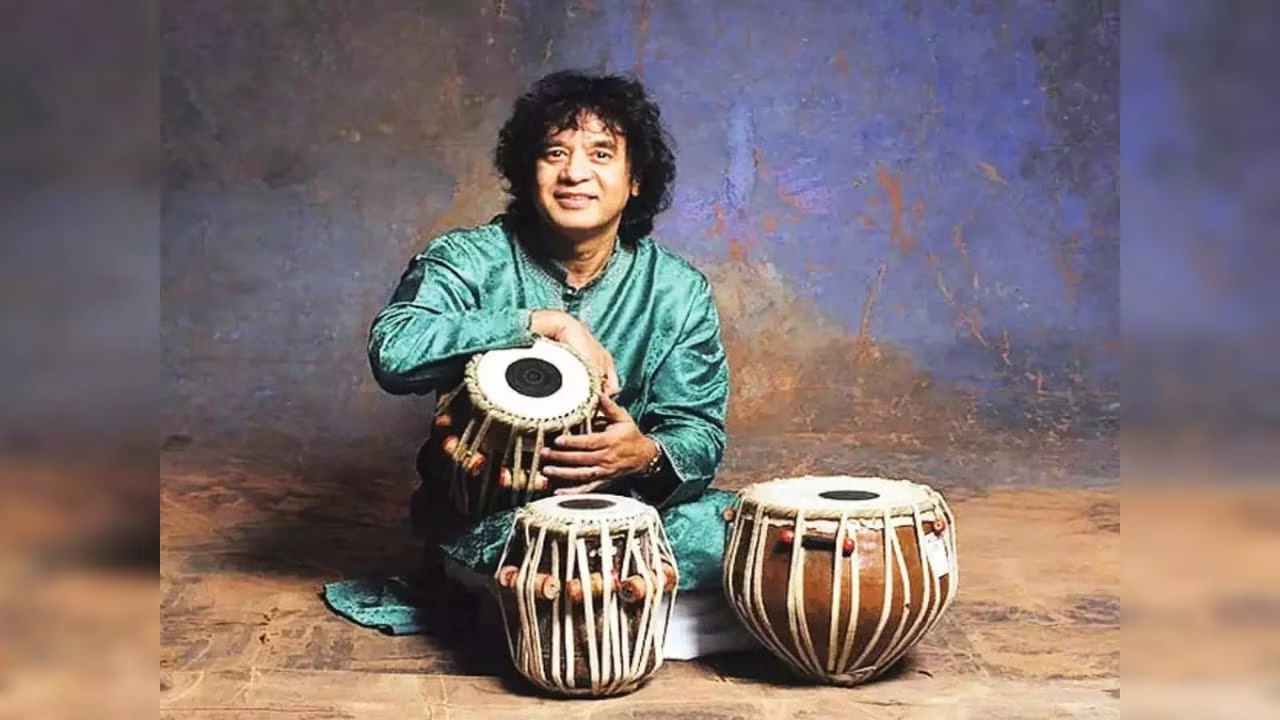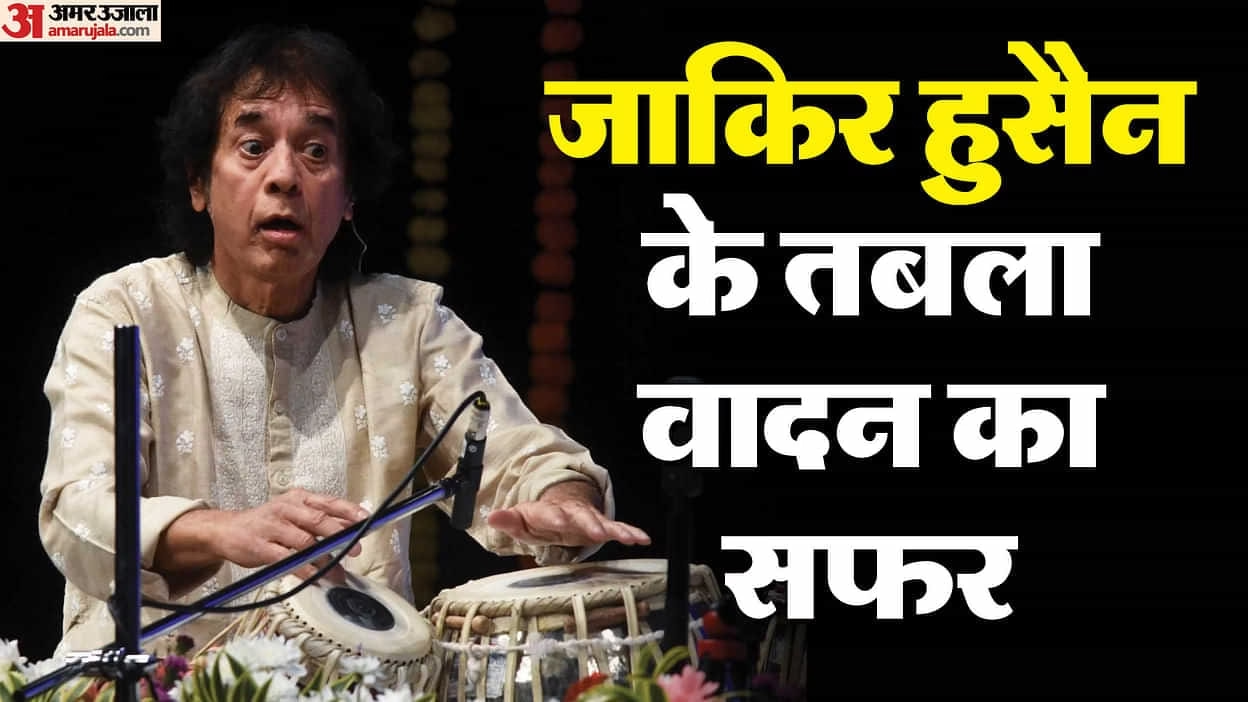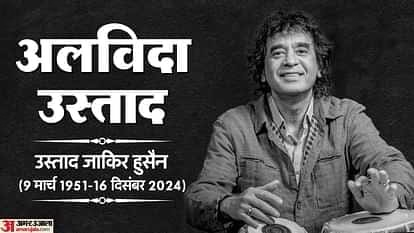Ustad Zakir Hussain: A Legendary Maestro of the Tabla (1951–2024)
Ustad Zakir Hussain (9 March 1951 – 15 December 2024) was a globally celebrated tabla virtuoso, composer, percussionist, and a true ambassador of Indian classical music. Renowned for his extraordinary command over rhythm and his innovative collaborations across genres, Zakir Hussain became a household name, revered for his ability to transcend cultural and musical boundaries.
Born in Mumbai, India, to the legendary tabla maestro Ustad Alla Rakha, Zakir was introduced to music at an early age. His father, a pioneering figure in the world of percussion, mentored him in the intricate art of tabla playing. Zakir’s prodigious talent became evident when he began performing professionally as a child, and by the time he turned 12, he had already shared the stage with some of India’s greatest musicians. He later attended St. Xavier’s College in Mumbai, balancing academics with an ever-expanding musical career.

A Phenomenal Career
Zakir Hussain’s illustrious career was marked by his innovative spirit and versatility. His collaborations with celebrated artists from around the globe gave Indian classical music an international audience. He co-founded the iconic fusion band Shakti with guitarist John McLaughlin, blending Indian classical traditions with jazz. Similarly, his work with Mickey Hart, the drummer of the Grateful Dead, resulted in the Grammy-winning Planet Drum project, which pioneered the concept of world music. Ustad Zakir Hussain: A Legendary Maestro of the Tabla (1951–2024)
As a solo artist, Zakir was unmatched in his virtuosity. His mastery of the tabla allowed him to perform complex rhythmic cycles with effortless grace, leaving audiences spellbound. He composed music for films like Vanaprastham and The Mystic Masseur, earning acclaim for his ability to infuse cinematic narratives with the evocative power of Indian music. Ustad Zakir Hussain: A Legendary Maestro of the Tabla (1951–2024)
Zakir Hussain’s discography features masterpieces such as Making Music (1987), Remember Shakti (1999), and Global Drum Project (2007). His final album, This Moment (2023), was celebrated as a testament to his enduring artistry.

Global Recognition and Accolades Ustad Zakir Hussain: A Legendary Maestro of the Tabla (1951–2024)
Over the decades, Zakir received countless accolades, recognizing his contributions to the arts:
- Padma Shri (1988), Padma Bhushan (2002), and Padma Vibhushan (2023): India’s highest civilian honors for his unparalleled contributions to music.
- Grammy Awards: He won four Grammys, including the Best World Music Album for Planet Drum and Global Drum Project.
- Sangeet Natak Akademi Fellowship (2018): India’s highest honor for performing artists.
- Kyoto Prize (2022): A Japanese award acknowledging his global influence in music.
In addition to these honors, Zakir was a revered teacher who mentored countless young musicians, ensuring that the art of tabla continued to thrive.

Personal Life and Philosophy
Zakir Hussain was married to Antonia Minnecola, a Kathak dancer, and their shared love for the performing arts enriched their lives. They had two daughters, who often spoke of their father’s humility, warmth, and passion for life. Zakir’s philosophy was deeply rooted in the idea that music is a universal language, capable of uniting humanity.
A Profound Legacy
Zakir Hussain’s passing on 15 December 2024, in San Francisco, due to idiopathic pulmonary fibrosis marked the end of an era. Yet, his legacy endures. His pioneering efforts brought Indian classical music to the global stage, inspiring a new generation of musicians and listeners.
Through his life and work, Zakir Hussain embodied the essence of a true maestro. His tabla rhythms continue to echo across the world, a timeless tribute to a life dedicated to the pursuit of musical excellence.
Ustad Zakir Hussain: A Timeless Beacon of Rhythm

Zakir Hussain’s life was a journey marked by unparalleled mastery, ceaseless innovation, and an unrelenting passion for rhythm. His passing has left an indelible mark on the world of music, but his extraordinary legacy continues to inspire generations of musicians and music lovers. Let us delve deeper into the life and contributions of this iconic artist.
The Early Years: A Prodigy in the Making
Born into a family deeply entrenched in the musical traditions of India, Zakir Hussain grew up in an environment where rhythm and melody were part of everyday life. His father, Ustad Alla Rakha, was already an internationally acclaimed tabla maestro and a favored accompanist of sitar legend Pandit Ravi Shankar. Under his father’s strict yet loving guidance, Zakir underwent rigorous training that began at the tender age of three.
Zakir’s early years were defined by discipline, practice, and an insatiable curiosity about the nuances of rhythm. By the age of seven, he was giving solo performances, showcasing his prodigious talent. He was not merely learning to play the tabla but mastering the deeper mathematical and emotional essence of its rhythms.

A Pioneer of Fusion
One of Zakir Hussain’s most celebrated contributions to music was his role as a pioneer in blending Indian classical music with global genres, creating an entirely new soundscape. His groundbreaking collaborations in the 1970s and 1980s paved the way for what we now call “world music.”
- Shakti and Beyond: Alongside John McLaughlin, violinist L. Shankar, and others, Zakir founded Shakti, a band that fused Indian classical traditions with jazz. The result was an electrifying and soulful exploration of rhythm and melody that enthralled audiences worldwide. Albums such as Remember Shakti are considered masterpieces.
- Planet Drum: Teaming up with Mickey Hart of the Grateful Dead, Zakir became a key figure in the Planet Drum project, which explored the rhythms of the world. The project was not just a musical collaboration but a cultural exchange, bringing together drummers from Africa, Latin America, and Asia. This effort won the first-ever Grammy for Best World Music Album in 1992.
Zakir’s collaborations extended beyond these projects, including working with George Harrison, Bela Fleck, Yo-Yo Ma, and many others. He played an instrumental role in introducing the tabla to a global audience, showcasing its versatility in classical, jazz, pop, and film music.
Film and Composition
Zakir Hussain was also a gifted composer who enriched the cinematic world with his evocative music. He worked on the soundtracks for several acclaimed films, blending traditional Indian sounds with modern cinematic needs.
Notable works include:
- Vanaprastham (1999): A hauntingly beautiful score for the Malayalam film, which went on to win multiple awards.
- The Mystic Masseur (2001): Zakir’s music lent an emotional depth to this Ismail Merchant film.
- Aparajito (The Undefeated): A homage to Satyajit Ray’s cinema, where his tabla rhythms added layers of meaning to storytelling.
His compositions were not limited to films. He also created concert pieces and works for dance performances, earning him recognition as a true innovator in the field.

Educational Contributions
A deeply generous teacher, Zakir Hussain believed in passing on the rich traditions of Indian classical music to the next generation. Over decades, he taught and mentored countless young musicians, both in India and abroad. As a visiting faculty member at institutions like Stanford University, he introduced Indian rhythm to students from diverse backgrounds.
His lectures and workshops emphasized not just technical proficiency but the spiritual connection to music. He often said, “Playing the tabla is like speaking a language—each beat is a word, and together they tell a story.”
Humility and Humanity
Despite his global fame, Zakir Hussain remained grounded and humble. Known for his playful sense of humor and warm demeanor, he was beloved by fans, collaborators, and students alike. He often credited his success to his father’s teachings and his mother’s unwavering support.
Beyond his music, Zakir was a tireless advocate for peace and cross-cultural understanding. He firmly believed that music could heal divisions and bring people together. His collaborations with musicians from different countries and backgrounds were a testament to this philosophy.

The Final Years
In the final years of his life, Zakir Hussain continued to perform, compose, and inspire. Despite battling idiopathic pulmonary fibrosis, a progressive lung condition, he remained committed to his art. His last performances in 2024 were filled with the same energy and brilliance that had characterized his career.
His passing on December 15, 2024, in San Francisco, left an entire world of music lovers in mourning. Tributes poured in from every corner of the globe, with fellow musicians, world leaders, and fans celebrating his life and legacy.
The Eternal Echo of His Tabla
Zakir Hussain’s contributions to music are immeasurable. He brought the tabla into the global spotlight, revolutionized Indian classical music, and created bridges between cultures through the universal language of rhythm.
Even though the maestro is no longer with us, his music continues to resonate—an eternal echo of his genius. Every beat of the tabla carries his legacy, ensuring that Zakir Hussain’s spirit lives on in the hearts of those who listen.

Let us celebrate the life of Ustad Zakir Hussain, a true maestro whose rhythms transcended time and space, bringing joy and unity to the worl
more knowledge you may visit here – Zakir Hussain (musician) – Wikipedia
Recent Posts
- Virat Kohli’s Struggles in Australia: A Lesson in Consistency and Challenges 2024
- 7 Hilarious Alexa Responses That Turned a Little Girl’s Gaali Request Into Pure Comedy Gold!
- Pooja Hegde’s 3 Power-Packed Movies Set to Revive Her Career in 2025!
- Kane Williamson: A Cricket Legend from New Zealand: A Cricket Legend from New Zealand 2024
- Travis Head: A Dynamic Australian Cricketer and ICC Finals Hero 2024

2 thoughts on “Ustad Zakir Hussain: A Legendary Maestro of the Tabla (1951–2024)”